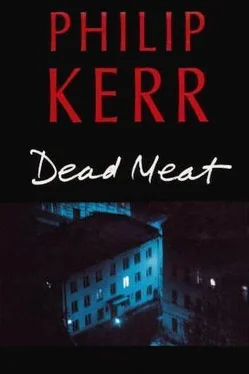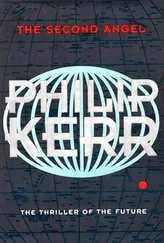Tanya was a different flock of sheep: young, beautiful and intelligent, she looked like one of those people who can travel — more like a musician or a ballet dancer than a doctor at the Vreden Casualty Institute. Of course the fact that she was so well-groomed I learned was due not at all to Grushko but to her boyfriend, Boris, who seemed to have unlimited access to foreign goods, or so Grushko told me later. She was also a rather capricious young woman, for I can think of no other explanation to account for why she should have chosen the occasion of my being there to announce that she and Boris were planning to get married. Unless it was simply that she knew Grushko was less likely to lose his temper about it with me being there. Or perhaps it was some sort of revenge for all the times he must have embarrassed her with his obvious dislike of Boris. Neither one of the explanations appeared to me to be particularly satisfactory. But then I am a lawyer.
On hearing the news, Lena Grushko and her old mother seemed delighted. But it was all Grushko could do not to take a bite out of his table mat. He did his best to make a show of being pleased but it wasn’t much of an act and it didn’t last longer than a couple of nods and a thin rictus of a smile. Still, Tanya was not about to let him get away with anything less than a complete Te Deum.
‘Aren’t you pleased for me, Dad?’ she said.
‘Well, naturally I’m pleased for you,’ he said with considerable difficulty. ‘Naturally...’ He frowned as he tried to think of something pleasant to say. Instead he found his line of argument.
‘But have you thought about where you’re both going to live? I mean, you could always have this room—’
I could see that this was not an idea that held much attraction for him.
‘Excuse me,’ I said. ‘Where’s the...?’
‘Left as you go out of the door,’ he said.
I left the room and opened the lavatory door, but did not go inside. Instead I went into Grushko’s bedroom. I listened to their raised voices for a second and then lifted the mattress.
‘We’re going to live with Boris’s parents,’ said Tanya. ‘At least until we can get a place of our own.’
‘That could be a lot harder than you think,’ said Grushko. ‘Apartments are not so easy to come by in Petersburg.’
‘Boris has lots of connections,’ she said glibly. ‘He’ll sort it out. You needn’t worry about that.’
‘Where do Boris’s parents live?’ asked Lena Grushko.
‘On Decembrist’s Square.’
‘Oh, how lovely.’
There was about fifty dollars under Grushko’s mattress, on his wife’s side of the bed. But this meant nothing. My own wife had amassed almost two hundred dollars before I moved out. I tucked the sheets in at the corners, flushed the toilet and then returned to the dinner table.
‘Not that modern block on the corner?’ said Grushko.
‘Yes. It’s very nice.’
‘But those apartments were built for people who were imprisoned by the tsar, and their descendants.’
‘Yes,’ said Tanya. ‘That would be Boris’s grandfather, Cyril.’
Grushko shook his head impatiently. ‘What I mean to say is that those flats were for people in the Party.’
‘But things are different now. The Party’s finished. You’re always saying so.’
‘Maybe so, but those people who were in the Party are still enjoying their old privileges. Including a nice apartment on Decembrist’s Square. Well, don’t you see?’
‘I haven’t seen them enjoying many privileges. They still have to queue for bread like anyone else. And they don’t own a car like you do.’
‘Living where they do, I don’t suppose they need one,’ said Grushko. ‘Besides, Boris has a car. A BMW.’
Grushko’s wife shot him a fierce look.
‘Yevgeni Ivanovich,’ she said stiffly. But before she could begin her reprimand the phone rang and Grushko got up to answer it.
I smiled politely at Tanya.
‘Congratulations,’ I said lamely. ‘I hope you’ll be very happy.’
‘We must ask Boris and his family to dinner,’ said Lena.
Tanya’s eyes drifted towards the doorway and the sound of her father speaking on the telephone.
‘I don’t know that that’s a very good idea,’ she said. ‘Besides, what could we feed them? A kilo of meat costs a week’s pay.’
‘I have a box of English soaps,’ said Lena. ‘I could trade that.’
‘Oh, Mum, you can’t trade that. Not your English soaps.’
‘Well, they’re much too good ever to use.’
When Grushko came back he was putting on his jacket.
‘I’m afraid I have to go out,’ he said quietly.
‘What’s up?’ I asked.
‘Sultan Khadziyev just called Nikolai at the Big House,’ he explained. ‘Apparently he wants to talk. A chance to clear his name. He reckons he can prove that he had nothing to do with Milyukin’s death.’
I got up from the table.
‘No need for you to leave,’ he said.
I glanced at Lena and her daughter and smiled.
‘I’m sure you’ve both got a lot to discuss,’ I said and quickly put on my own jacket. ‘Thank you for a lovely dinner.’
Grushko grunted indifferently but I had the feeling that he welcomed the company.
‘So where are we going?’ I asked him as we went down in the lift.
‘He wants to meet in the open,’ said Grushko, looking at his watch. ‘I’m to be on Bank Bridge across the Griboyedev Canal in twenty minutes.’
‘Can you trust him?’
‘We’ve got nothing to lose. And since there wasn’t time to trace the call I really don’t see any alternative.’
‘So you’re just going to stand there and wait for him to turn up?’
‘Maybe I should surround the area with militiamen and risk scaring him off: is that what you’re suggesting?’
‘You could wear a wire.’
Grushko chuckled. ‘You’ve been watching too many movies, my friend,’ he said. ‘We’ve got one set of walkie-talkies for the whole department and they only work in open areas. Made in the USSR, just like this lousy lift.’ He thumped the side of the urinous cabin impatiently.
‘About a month ago, we were going to pick this guy up in the Kutznechny Market. We had the place surrounded but the building was interfering with the walkie-talkies. So I had to get a man to keep running round the building to keep everyone informed of what was happening. How’s that for a modern police force?’
‘Couldn’t the KGB...’
‘We can just about twist their arms to install a few bugs for us. Like that Georgian funeral wake. But a wire, no. Not that that bug was worth the trouble. Most of the Georgians were too drunk for us to make out what they were saying.’
The lift arrived on the ground floor with a lurch and we walked unsteadily outside into the late evening sunshine. These white nights took a bit of getting used to. As we drove south and then west along Nevsky, we saw so few people on the streets that one might almost have thought that there had been some terrible, Chernobyl-style nuclear accident.
‘You know, I never mind being called out late at this time of year,’ said Grushko. ‘It gives me a chance really to see the city. This place must have been something before the revolution. It’s nights like these when you might almost imagine that the whole thing was just a bad dream, you know? That it never happened.’
Passing Moscow Station we saw a group of ragged children collected in front of the station’s great arched doorways. The clock on top of the short square tower said eleven-thirty.
‘It’s a bit late for kids to be out,’ I observed. ‘Some of them don’t look more than ten years old.’
‘Runaways,’ said Grushko. ‘City’s full of them. They prefer to move around at night, like rats, when there’s less chance of being picked up by the children’s militia.’
Читать дальше












